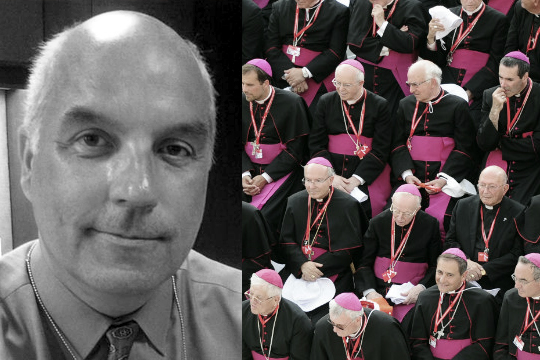If anyone needed more evidence of just how cynical the U.S. Catholic bishops’ manipulation of the principle of “religious freedom” is, look no further than last week’s dismissal of Tony Spence, the editor in chief of Catholic News Service, for tweeting his opposition to bills that would codify LGBT discrimination.
The U.S. Conference of Catholic Bishops built its “religious liberty” campaign, which was largely responsible for creating the broad, corrupted definition of religious liberty that has resulted in a wave of anti-LGBT bills across the country, around the idea that religious liberty is the “first, most cherished liberty”—and that to deny it is a violation of core American values:
Freedom is not only for Americans, but we think of it as something of our special inheritance, fought for at a great price, and a heritage to be guarded now. We are stewards of this gift, not only for ourselves but for all nations and peoples who yearn to be free. Catholics in America have discharged this duty of guarding freedom admirably for many generations.
Even as the Catholic hierarchy bewails the lack of respect for “religious freedom,” they demanded that Spence resign for daring to publicly oppose anti-LGBT legislation that the bishops back under the “religious freedom” rubric.
In March, Spence tweeted “LGBT protections get flushed as NC governor signs bill over #bathroomwars,” in response to the controversial North Carolina law that would require transgender individuals to use bathrooms corresponding to the gender on their birth certificate. He also tweeted his opposition to a proposed law in Tennesse, calling it “stupid,” and tweeted an article noting that “religious liberty has replaced gay marriage in GOP talking points, fooling no one.”
The USCCB owns and runs the Catholic News Service, but officially CNS is editorially independent from the bishops’ conference and provides news to both secular and religious outlets. In reality, however, it’s always existed in a somewhat liminal space journalistically speaking, combining fundamentally solid reporting with a pro-hierarchy tilt in story selection, heavy on stories that feature official Catholic voices and pro-life angles.
Nonetheless, many conservatives still viewed the outlet with suspicion. In 2009, Cardinal Raymond Burke, who was then an official at the Vatican, criticized Spence for running columns by Pepperdine University law professor Douglas Kmiec, who argued during the 2008 presidential election that pro-life Catholics could vote for Barack Obama because of his strong social welfare policies:
The bishops need to look at our Catholic News Service; they need to review their coverage of [the Church’s moral and social teachings] and give some new direction.
Spence accused the bishops of succumbing to pressure from far-right Catholic sites like the Lepanto Institute, Church Militant, and LifeSiteNews, which accused him of having “an agenda that is in direct conflict with the teachings of the Catholic Church.”
Spence voiced surprise that his Tweets caused a “backlash,” but shouldn’t have been. Across the country, conservative Catholic bishops have pushed employees of Catholic institutions to sign what are in effect loyalty oaths that promise to monitor the Twitter accounts and Facebook pages of employees of Catholic institutions.
It’s hard to image senior officials at the USCCB ignoring the editor-in-chief of the CNS publicly contradicting the conference’s stated position, especially as bishops in states like North Carolina have backed the bathroom bills and concern about “gender ideology” has surpassed the contraceptive mandate as the conference’s ongoing obsession.
In December the USCCB issued a statement on “gender ideology” that called it “a position on anthropology (who a human being is) that is in conflict with the Christian one” and said that sex reassignment surgery was against the moral law.
The Nebraska Catholic Conference criticized pro-transgender bathroom policies as “harmful and deceptive gender ideology.”
San Francisco Archbishop Salvatore Cordileone joked last year that he was sure more transgender identities “will be invented as time goes on” and said the acceptance of “gender ideology” threatens not only the faith, but the very foundation of human society, predicting “a reversion to the paganism of old, but with unique, postmodern variations on its themes, such as the practice of child sacrifice, the worship of feminine deities or the cult of priestesses.”
With the issue having moved from widespread acceptance of openly gay people and same-sex marriage to greater understanding and acceptance of trangender people—and public opinion having turned against measures to allow LGBT discrimination—the bishops’ strategy appears to be ever-tighter wagon-circling, and Spence was definitely on the outside of the circle.
Spence’s firing, and the lack of respect for both freedom of the press and individual conscience it reflects, shows just how transactional the bishops’ relationship with fundamental American freedoms really is.


